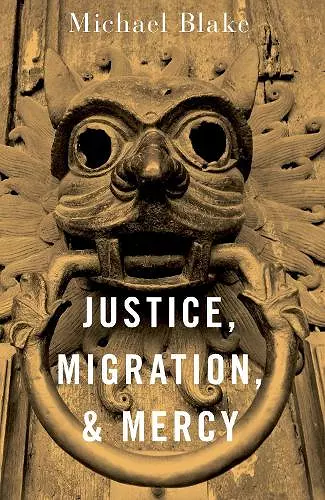Justice, Migration, and Mercy
Format:Paperback
Publisher:Oxford University Press Inc
Published:9th Mar '23
£18.99
Available to order, but very limited on stock - if we have issues obtaining a copy, we will let you know.
This paperback is available in another edition too:
- Hardback£36.49(9780190879556)

Political controversy about migration is becoming more frequent, more heated, and for certain groups, decidedly more urgent. This raises pressing questions not only in the realms of policy-making and public discourse, but also for philosophical accounts of migration. Do liberal states have the right to exclude unwanted outsiders, or should all borders be open? How should we begin to theorize the morality of refugee and asylum policy? If states can exclude unwanted outsiders, what ethical principles govern the determination of who gets in? Justice, Migration, and Mercy offers a way in which these questions might be answered by providing a vision of how we can understand the political morality of migration. Michael Blake offers a novel, and plausible, account of the right to exclude on which that right is grounded on a more fundamental right to avoid unwanted forms of political relationship. Far from simply justifying exclusion, however, Blake examines the best justifications for exclusion in an effort to determine its limits. In doing so, he challenges the current global realities of migration which ensure open borders for a select few and closed borders for the majority, most often the most marginalized in society. His account sheds light on more specific questions of justice in migration, such as the permissibility of travel bans and carrier sanctions. He also offers a particular vision about how to go beyond questions of right and liberal justice, towards a declaration of the sort of community we wish to be. Blake then identifies the moral notion of mercy as a central one for the moral analysis of migration, a move which leads to the conclusion that we ought to show mercy and justice in constructing migration policy as well as in public debate.
The literature on migration in political philosophy is by now mature, and well-trodden argumentative paths map the contours of its central questions. This makes it all the more impressive that Michael Blake's Justice, Migration, and Mercy manages to navigate those questions in a novel and genuinely distinctive way, as well as to chart out new routes for exploration in the terrain of debate. It will prove valuable to both students of migration in political philosophy, for the lucidity with which it approaches its central questions and relates them to contemporary migration politics (especially in the USA), and to partisans in the debates in which Blake engages, for the original perspective that it articulates and for Blake's thoughtful engagement with his interlocuters. * Jamie Draper, Res Publica *
What is unique about Blake's book is that he goes beyond justice to argue that mercy creates other obligations for us to take care of other people, regardless of whether those people have rights in justice to that sort of care. It is a strength of his book that it inspires us to think beyond simply what liberal states must do to avoid being unjust, to the virtues that such states ought to cultivate to become morally better political communities. * Renée Nicole Souris, Philosophia *
In conclusion, Michael Blake's new book is a relevant contribution to the migration ethicsliterature to the extent that it introduces a major challenge to the open borders position whileinviting migration scholars to get rid of the restraints of justice by enriching their moral vocabulary. * Mario Josue Cunningham Matamoros, Ethical Theory and Moral Practice *
Michael Blake's book offers a distinctive and illuminating perspective on questions about immigration. Blake is a well known political philosopher, and this book has his characteristic clarity, precision, and sharpness. The book is aimed at a wider audience than his fellow philosophers, however. It is filled with examples, stories, and links to current political debates that will help ordinary readers to understand why it is important both to reflect carefully about highly contested issues and to expand the moral vocabulary that dominates conventional discussions of immigration. It is an engaging and provocative read. * Joseph H. Carens, Professor of Political Science, University of Toronto *
In the increasingly polarized literature on migration, Blake's approach will be controversial. The book defends some bracing conclusions: Blake argues that would not be unjust for the state to deport undocumented migrants, to prevent the spouses and family members of its own citizens from settling, and to close its borders to all would-be migrants except refugees (though these acts would be unmerciful). Still, even those who disagree (as I do) with these policy conclusions will find the book of considerable philosophical interest. Blake connects migration ethics to a broader picture of what states owe members and outsiders in a world structured as a system of separate legal jurisdictions. This is a real innovation in the migration literature, and an idea worth building upon. * Anna Stilz, Notre Dame Philosophical Reviews *
For several years Michael Blake has been among the most important contributors to the philosophical literature on immigration. This book is therefore greatly anticipated and develops a number of fruitful arguments....[T]his is one of the most important books on immigration policy in the past few years and should be read by those with an interest in the topic, as well as by people hoping to develop accounts of virtues other than justice in political philosophy. * Matt Lister, Ethics *
ISBN: 9780197682432
Dimensions: 235mm x 156mm x 16mm
Weight: 413g
280 pages